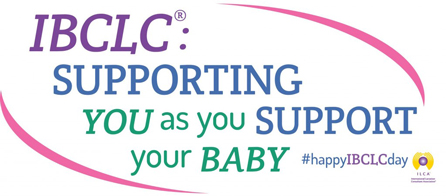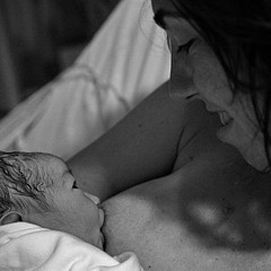March 04, 2015
Thanks IBCLCs - For Helping New Families Meet Their Breastfeeding Goals
By: Sharon Muza, BS, LCCE, FACCE, CD/BDT(DONA), CLE | 0 Comments
 Yesterday was IBCLC Day - a special day set aside once a year to recognize the hard work and efforts that International Board Certified Lactation Consultants provide all all year long in support of breastfeeding for mothers, babies and really, the entire family. IBCLC Day is sponsored by the International Lactation Consultant Association, a professional organization for IBCLCs around the world.
Yesterday was IBCLC Day - a special day set aside once a year to recognize the hard work and efforts that International Board Certified Lactation Consultants provide all all year long in support of breastfeeding for mothers, babies and really, the entire family. IBCLC Day is sponsored by the International Lactation Consultant Association, a professional organization for IBCLCs around the world.
Becoming an IBCLC is no easy feat; the requirements to become credentialed are very rigorous and involve many clinical hours and an exhaustive exam. Continuing education hours and/or retaking the exam are required every 5 years to maintain the credentials. There are over 27,450 IBCLCs worldwide.
Some IBCLCs are also Lamaze Certified Childbirth Educators. Both organizations represent the gold standard in their field and it is not surprising that some professionals seek out both qualifications. When an LCCE is also an IBCLC, their class families can really benefit. The LCCE is able to weave in a rich knowledge of breastfeeding topics and information throughout the class, as well as share information about common challenges that they see when working as an IBCLC.

CC flickr photo by robysaltori:
http://flickr.com/photos/robysaltori/4604876371
A lactation consultant can use their childbirth education skills to hone their communication and help families understand the nuances of feeding their babies when they are delivering breastfeeding information during a consultation. The two professions can complement each other beautifully.
Of course, the scope of practice of LCCEs and IBCLCs is different, and it is important to recognize the separation and to wear the proper hat when conducting yourself professionally in either capacity.
For official information on how to become an IBCLC, check out the information on the International Board of Lactation Consultant Examiners (IBLCE ) site. If you are considering becoming an IBCLC, there is an Facebook Group just for you, where you can discuss the different pathways, find out more about the requirements and costs, and receive the support of other men and women exploring the IBCLC process and preparing for the exam.
I reached out to some Lamaze Certified Childbirth Educators, who are also IBCLCs, to ask some questions and learn more about experience of wearing both hats. Teri Shilling, Ann Grauer and Ashley Benz generously shared their thoughts below.
Sharon Muza: Which credential did you receive first, your IBCLC or your LCCE?
Teri Shilling: I received my LCCE first.
Ann Grauer: I was an LCCE first. I never thought I'd be an IBCLC but one year the policies fit me and I decided to go for it.
Ashley Benz: I became an LCCE first and then an IBCLC. My goal had always been to become a lactation consultant. I knew that it was a long road and I was so interested in getting started working with families that I did a couple of certifications before I was ready to take my IBCLC exam.
SM: How does having both credentials benefit your students and clients?
Teri: So much of my work as an IBCLC is education - by the bedside, on the phone, etc. Keeping things simple and memorable is key. The certifications speaks to my professionalism and commitment to continuing education
Ann: I had a CLC before my IBCLC - I've always felt that I wanted and needed more information on breastfeeding. I've taught breastfeeding classes since the beginning but the information explosion in that one topic is incredible! I feel very strongly that it serves my childbirth classes well that I have that credential and that being an LCCE serves my breastfeeding clients. I see things from a "facilitator of education" standpoint, rather than a traditional IBCLC standpoint.
Ashley: Because a lot of what a lactation consultant does is teach, I use the skills I've gained from teaching Lamaze class in breastfeeding consultations. In Lamaze class, I use my knowledge about breastfeeding and mother-infant bonding.
SM: Does your IBCLC knowledge influence how and what you teach about breastfeeding?
Teri: Yes, I think it does, but I have been an IBCLC for 20+ years and can't remember what I taught before. But being an IBCLC gives me first had experience with the big bumps in the road many women hit during the postpartum time.
Ann: Yes. I've actually simplified what I teach. Being an IBCLC, means I now appreciate that parents need simple and honest information that they can incorporate into their parenting.
Ashley: I probably emphasize the need to seek proper help more than other educators. My class focuses on the basics of breastfeeding and assumes I've convinced my students to get support for issues that arise.
SM: What would you recommend for other LCCEs who might want to be an IBCLC? What are the challenges?
Teri: Do a community search for where the gaps are in support - is there a breastfeeding coalition in your area? It is important to network. Find a mentor. I would say go for it. More education never hurts. The challenge is being employed as an IBCLC as a non-nurse. It helps if you are the entrepreneur type and able to set up a private practice.
Ann: If you're a non-RN you will have to work incredibly hard. The system is set up to be medically-minded and there is not appreciation/understanding of what non-RNs bring to the table. Which, by the way, is a lot. Rather than focusing on becoming an IBCLC, allow yourself to enjoy the journey of learning and you'll be there before you know it.
Ashley: The major challenge of the IBCLC path is that it can be very time (and often financially) intensive. I recommend checking out the IBLCE website and see if there is a pathway that you already fit into. If not, make a five-year plan to become an IBCLC.
SM: Where do you think it gets tricky wearing both hats?
Teri: I don't think it does. I love being able to be part of the continuum from pregnancy to postpartum.
Ann: I don't think it does. My confidence is in the mother and baby. I'm just here to help in any role I can.
Ashley: Whenever you have multiple sets of skills, it can be difficult to maintain appropriate business boundaries and communicate those to your students and clients.
Careers as both a Lamaze Certified Childbirth Educator and an International Board Certified Lactation Consultant are fun, challenging and very rewarding. They are a wonderful compliment to each other and families can benefit from the knowledge that someone who holds both credentials can share when serving in either role. Are you an LCCE who has considered or would like to become an IBCLC? Are you already on that path? Share a bit about your journey in our comments section and let us know.
Tags
Breastfeeding Childbirth education Lamaze International Lamaze Educators IBCLC IBCLC Day Babies internet Doulas LCCE childbirth education business entrepreneur birth business childbirth professional doula business Interactive Ann Grauer Ashley Benz